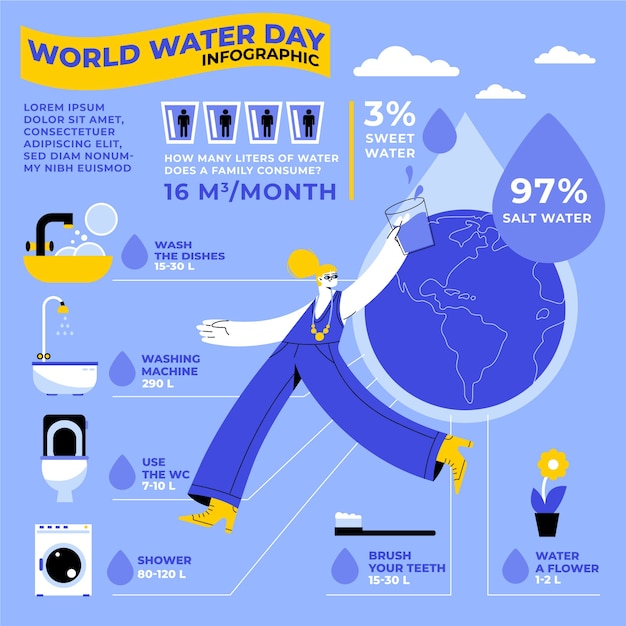Interesting Facts about Water

Water is essential for all life on earth.
The human body is made up of about 60% water.
Water is the only substance that can exist in all three states of matter: solid, liquid, and gas.
The Earth’s surface is about 71% water.
Water is the most common substance found on Earth.
The world’s oceans contain about 97% of the Earth’s water.
Water is a universal solvent, meaning it can dissolve more substances than any other liquid.
The average person in the United States uses about 80-100 gallons of water per day.
Water regulates body temperature through perspiration and respiration.
The water cycle is the continuous movement of water on, above, and below the Earth’s surface.
Water expands when it freezes, making it less dense than liquid water.
Water is tasteless, odorless, and colorless.
Drinking water helps improve concentration and cognitive function.
Water plays a crucial role in agricultural production, providing hydration to plants and crops.
Water is a habitat for countless species of plants and animals.
The Great Barrier Reef is the largest living structure on Earth and is primarily made up of coral, which needs clean water to survive.
Water scarcity affects over 2 billion people worldwide.
Water pollution from human activities is a significant global concern.
Water is used in many industrial processes, such as manufacturing and energy production.
Interesting Facts about Water part 2
Water can be used as a renewable source of energy through hydropower.
Water has a high surface tension, allowing insects and small animals to walk or skate on its surface.
Water can be used as a medium for transportation, such as rivers and canals.
Water can erode rocks and create breathtaking landscapes such as canyons and waterfalls.
The Dead Sea is one of the saltiest bodies of water in the world, making it nearly impossible for humans to sink.
Water is one of the primary ingredients in many beauty and skincare products.
Water can help alleviate symptoms of dehydration, such as headaches and fatigue.
Water has been used for centuries in various cultural and religious ceremonies.
Water is an excellent conductor of electricity.
Water makes up a significant portion of the Earth’s atmosphere in the form of water vapor.
Water has a high specific heat capacity, meaning it can absorb and retain a large amount of heat.
Water is essential for digestion and the absorption of nutrients in the body.
Water can dissolve minerals from rocks and soil, adding essential nutrients to aquatic ecosystems.
Water supports the growth of aquatic plants and algae, which are vital for the production of oxygen.
Water can create mesmerizing patterns and reflections when disturbed or still.
Water plays a vital role in human sanitation and hygiene.
Water has many therapeutic benefits, such as in hydrotherapy and balneotherapy.
Water molecules are made up of two hydrogen atoms bonded with one oxygen atom (H2O).
The H2O molecule has a bent shape, giving water its unique properties.
Water can change its density and salinity, allowing it to sink or float in different bodies of water.
Water has been used for thousands of years as a means of recreation and entertainment, such as swimming and water sports.
Water is crucial for the functioning of the kidneys, as it helps remove waste and toxins from the body.
Water plays a vital role in photosynthesis, the process by which plants convert sunlight into energy.
Water scarcity can lead to conflicts and disputes over access to clean water resources.
Water can be purified through various methods, such as filtration, distillation, and reverse osmosis.
Water is a finite resource that needs to be conserved and protected for future generations.